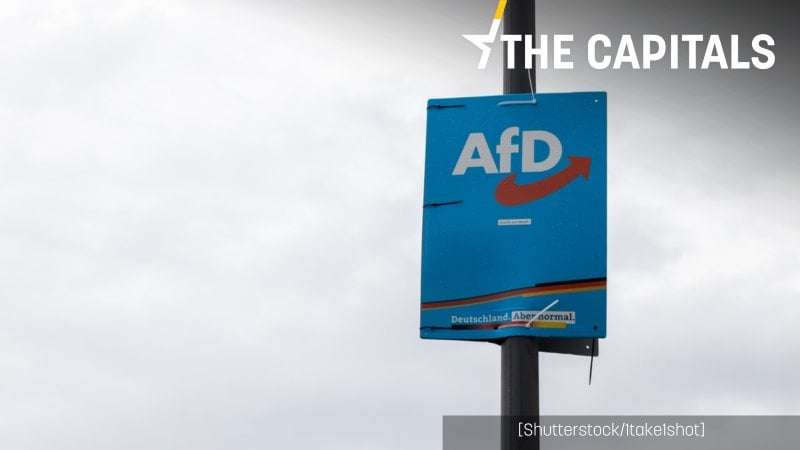The far-right Alternative for Germany (AfD) is set to make the controlled dissolution of the EU one of its key targets for the upcoming European elections, with its leader Tino Chrupalla calling Hungary’s Prime Minister Viktor Orbán one of his main allies.
In their EU election manifesto proposal, which is due to be ratified during the party conference on 29 July, the AfD calls for a “controlled dissolution” of the “overbearing EU”.
“We’re demanding a reset for Europe so that we can use the potential of nation-states and rebuild the bridge to the east,” Chrupalla, co-leader of the AfD, told EURACTIV.
The EU is an “economic area alone and should remain one,” he added.
The European Union “hogs national competencies without being able to replace the nation-state” while being insufficiently democratic as the Commission lacks legitimacy, he argued.
Chrupalla also cited EU sanctions against Russia as a prime example of the EU’s illegitimacy, saying they were “not in the interest of citizens” and led to rising inflation and recession.
Instead, the AfD is proposing to replace the EU with “a new European economic and interest-based community, a league of European nations”.
The AfD’s proposal, which would effectively lead to Germany exiting the EU, has been a longstanding party position originally found to dissolve the monetary union.
Already in the last Bundestag elections, the AfD campaigned for the complete dissolution of the EU.
Since then, however, the positions of many of its far-right sister parties in the EU political group Identity and Democracy (ID) groups have softened considerably.
Marine Le Pen’s far-right Rassemblement National party in France, for instance has since abandoned the idea to dissolve the EU and pushed for a fundamental reform of the bloc instead – something the AfD says is impossible.
Similarly, Matteo Salvini’s far-right Lega party in Italy is currently looking to become more presentable while forging a broad alliance with the centre-right forces for the upcoming elections, slowly abandoning its eurosceptic ideas.
However, Chrupalla is optimistic that the dissolution of the EU could take shape and is placing his bets on the right-wing parties in Austria and Hungary.
“The prospects [for implementing the proposal] are good as the global trend is in our favour,” he said.
Both Austria and Hungary would be ideal partners and natural allies for the AfD.
“The Central European cooperation with Hungary and Austria is of central importance for Germany,” said Chrupalla, adding that Orbán “is already showing how interest-based politics can be realised in Europe.”
On the side of Austria, the far-right Freedom Party (FPÖ) is currently leading the polls despite its frequent allegations of corruption. Similarly, Orbán’s Fidesz is projected to gain almost half of the votes, with its closest contender lagging nearly 30% behind.
The AfD itself also recently made a comeback as the party is currently polling second place at around 20%, even ahead of the Chancellor’s social democratic (SPD) party.
Meanwhile, the FPÖ has already voiced their support for the AfD.
“We view the development that the European Union has taken in recent years quite critically and with great concern,” Harald Vilimsky, delegation leader of the FPÖ in the European Parliament, told EURACTIV.
“Of course European citizens should have the choice if they still agree with the [EU’s] development or if they would rather go in a direction closer to the basic ideas of integration, namely, peace, freedom and wealth,” he added.
However, while Orban’s Fidesz is ideologically close to the AfD, it is not aligned to any group in the European Parliament since it left the centre-right EPP.

Aggravating_Boy3873 on July 14th, 2023 at 15:01 UTC »
Why is AfD getting popular? Aren't they a bit extremist? I thought there were other options for conservative parties why vote for this particular one?
dydas on July 14th, 2023 at 15:00 UTC »
I'm baffled by the notion that the solution to a supposedly illegitimate organ is the creation of a different institution even less democratic.
donutloop on July 14th, 2023 at 12:09 UTC »
Submission Statement
The far-right Alternative for Germany (AfD) is planning to focus on the "controlled dissolution" of the European Union (EU) in the upcoming European elections. The AfD leader, Tino Chrupalla, expressed his intention to re-establish the potential of nation-states, describing the EU as an economic area that should remain as such. Chrupalla criticizes the EU for overstepping national competencies and lacking sufficient democratic legitimacy. He further accuses the EU's sanctions against Russia as examples of its illegitimacy. The AfD proposes a "new European economic and interest-based community, a league of European nations" to replace the EU. While far-right groups in France and Italy have shifted from this stance, Chrupalla is hopeful that right-wing parties in Austria and Hungary will support this cause. Currently, the AfD is second in the polls, while the far-right Freedom Party (FPÖ) in Austria leads despite corruption allegations, and Hungary's Fidesz is expected to gain almost half of the votes.